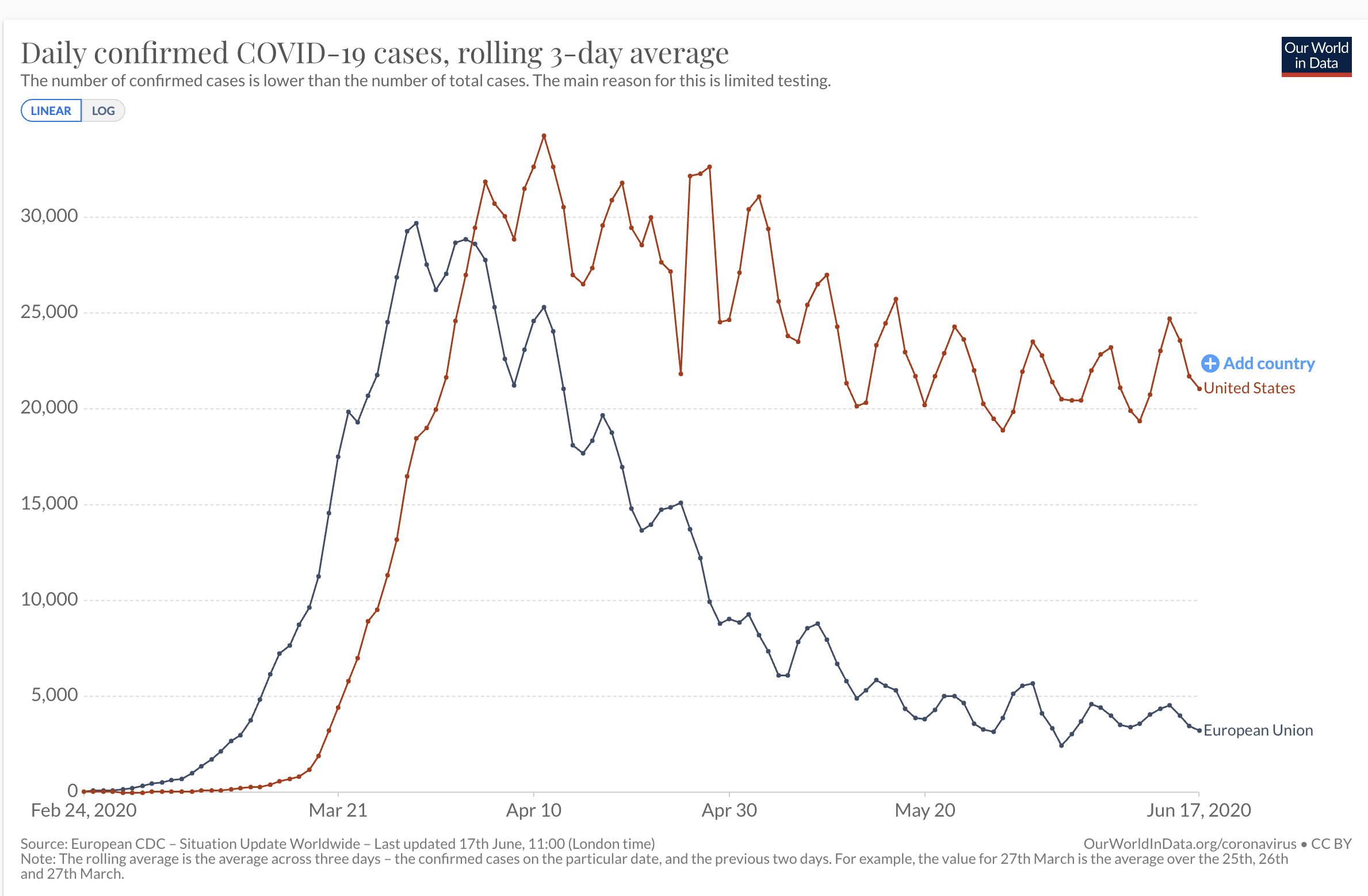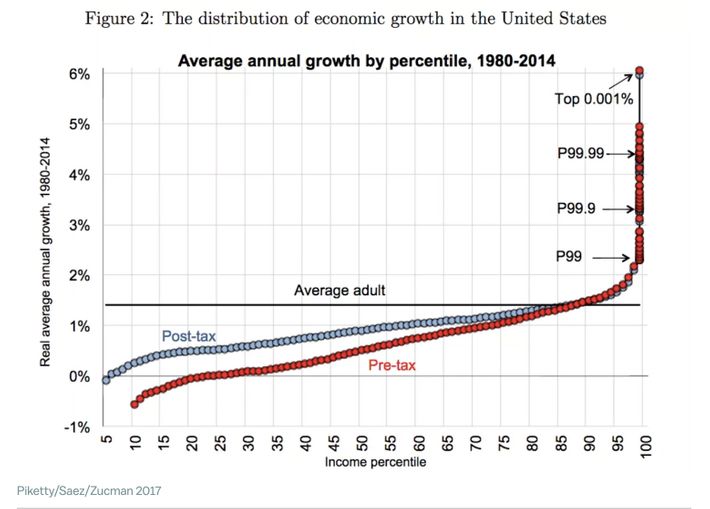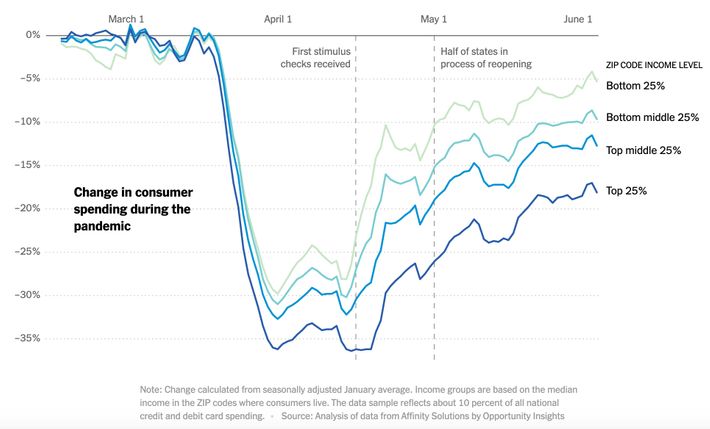| Author | Thread |
|
smackeddog
Posts: 38386 Alba Posts: 0 Joined: 3/30/2005 Member: #883 |
Some good news at last!
Dexamethasone is first life-saving coronavirus drug https://www.bbc.co.uk/news/health-53061281
This is why playing for time is so important, and just giving up and opening everything up now is gross negligence |
| AUTOADVERT |
|
martin
Posts: 69005 Alba Posts: 108 Joined: 7/24/2001 Member: #2 USA |
martin wrote:kind of scary how some countries handle corona outbreaks and how we compareTweet was deleted or there was problem with the URL: Troubling Tweet was deleted or there was problem with the URL: Official sponsor of the PURE KNICKS LOVE Program
|
|
martin
Posts: 69005 Alba Posts: 108 Joined: 7/24/2001 Member: #2 USA |
ah the trickling of stupidity starts to come out
Tweet was deleted or there was problem with the URL: Official sponsor of the PURE KNICKS LOVE Program
|
|
martin
Posts: 69005 Alba Posts: 108 Joined: 7/24/2001 Member: #2 USA |
Leader of our country
Tweet was deleted or there was problem with the URL: Official sponsor of the PURE KNICKS LOVE Program
|
|
martin
Posts: 69005 Alba Posts: 108 Joined: 7/24/2001 Member: #2 USA |
Tweet was deleted or there was problem with the URL: Tweet was deleted or there was problem with the URL: Official sponsor of the PURE KNICKS LOVE Program
|
|
martin
Posts: 69005 Alba Posts: 108 Joined: 7/24/2001 Member: #2 USA |
NYS should be the benchmark for every state IMHO. Hit the worst and by a large factor. I'd discount California and some other specific areas/states because of proximity and/or early timing of when corona hit but New York has density like no other. Most all other states had enough early warnings and there is really no excuse.
Tweet was deleted or there was problem with the URL: Official sponsor of the PURE KNICKS LOVE Program
|
|
djsunyc
Posts: 44927 Alba Posts: 42 Joined: 1/16/2004 Member: #536 |
martin wrote:NYS should be the benchmark for every state IMHO. Hit the worst and by a large factor. I'd discount California and some other specific areas/states because of proximity and/or early timing of when corona hit but New York has density like no other. Most all other states had enough early warnings and there is really no excuse.Tweet was deleted or there was problem with the URL: let's wait another 3-4 weeks. protests combined with all those fools drinking outside w/ no masks may create another spike. |
|
smackeddog
Posts: 38386 Alba Posts: 0 Joined: 3/30/2005 Member: #883 |
martin wrote:Tweet was deleted or there was problem with the URL: Absolute fools. |
|
martin
Posts: 69005 Alba Posts: 108 Joined: 7/24/2001 Member: #2 USA |
djsunyc wrote:martin wrote:NYS should be the benchmark for every state IMHO. Hit the worst and by a large factor. I'd discount California and some other specific areas/states because of proximity and/or early timing of when corona hit but New York has density like no other. Most all other states had enough early warnings and there is really no excuse.Tweet was deleted or there was problem with the URL: well, yes, I guess I did discount the protests and effects from them but do think that may be universal. Cuomo gotta crack down on all of it. I am still flabbergasted at how other countries are handling and responding to flare ups. Wuhan emergence, test 11M people in a week. Outbreak in Bejiing? Shut everything down immediately. New Zealand? Let open up everything and get back to normal cause we did right Official sponsor of the PURE KNICKS LOVE Program
|
|
martin
Posts: 69005 Alba Posts: 108 Joined: 7/24/2001 Member: #2 USA |
EU v US
https://talkingpointsmemo.com/edblog/failure-abject-failure I have spent a lot of time analyzing the New York COVID epidemic both because it was the center of the storm in the United States and because it affects me, my loved ones and coworkers so directly. The graphed shapes of the New York outbreak and the nationwide outbreak are quite different. The former rockets upward and falls down again at a slower but still comparable arc. Nationwide it’s quite different. The numbers rocket upward and then basically plateau. It’s not a proper comparison. The epicenter of an outbreak has different dynamics than the more rolling spread of contagion in less hard hit areas. This is why the proper comparison is not New York vs the United States or the United States versus any European country, all of which are dramatically smaller than the US, both in geography and population. The proper comparison is the United States (~330 million) vs the EU (~440 million). This brings together hotspots and peripheries, urban and rural and all the mix of population densities into one. As you can see here the progress has been very different and not at all good for the control of the epidemic in the United States.
Official sponsor of the PURE KNICKS LOVE Program
|
|
BigDaddyG
Posts: 37651 Alba Posts: 9 Joined: 1/22/2010 Member: #3049 |
https://www.ibtimes.sg/humans-may-never-develop-immunity-against-covid-19-suggests-us-chinese-joint-study-47055
Humans May Never Develop Immunity Against COVID-19, Suggests US-Chinese Joint Study Chinese and American researchers made the conclusion after finding just 4% of 23,000 samples could develop antibodies The Chinese and American scientists found an answer to their quarries on immunity against the novel Coronavirus. The final outcome of their analysis came after they looked into a study on whether hospital workers in Wuhan who were directly exposed to infected patients at the early stage of the outbreak had developed antibodies. Their findings suggested that there may be no immunity against the COVID-19. Always... always remember: Less is less. More is more. More is better and twice as much is good too. Not enough is bad, and too much is never enough except when it's just about right.
- The Tick
|
|
martin
Posts: 69005 Alba Posts: 108 Joined: 7/24/2001 Member: #2 USA |
BigDaddyG wrote:https://www.ibtimes.sg/humans-may-never-develop-immunity-against-covid-19-suggests-us-chinese-joint-study-47055 I'm not smart enough to understand what all this means. No antibodies produced for those who may have been positive.... meaning they could catch again? Could still spread (perhaps only when they have symptoms)? Kinda scary Official sponsor of the PURE KNICKS LOVE Program
|
|
BigDaddyG
Posts: 37651 Alba Posts: 9 Joined: 1/22/2010 Member: #3049 |
martin wrote:BigDaddyG wrote:https://www.ibtimes.sg/humans-may-never-develop-immunity-against-covid-19-suggests-us-chinese-joint-study-47055 Yeah, also, what does this mean for traditional viral vaccines? Will the concept of herd immunization turn to heard slaughter? How cost efficient will a vaccine be even if it's developed? This really is scary if the findings are found to be accurate. Always... always remember: Less is less. More is more. More is better and twice as much is good too. Not enough is bad, and too much is never enough except when it's just about right.
- The Tick
|
|
martin
Posts: 69005 Alba Posts: 108 Joined: 7/24/2001 Member: #2 USA |
BigDaddyG wrote:martin wrote:BigDaddyG wrote:https://www.ibtimes.sg/humans-may-never-develop-immunity-against-covid-19-suggests-us-chinese-joint-study-47055 So far, the gov't has failed at supply chain management and production of various supplies throughout all of this, I'd guess we are as ****ed with management of a potential vaccine as well. Not the development of the actual vaccine but what comes after that. Official sponsor of the PURE KNICKS LOVE Program
|
|
djsunyc
Posts: 44927 Alba Posts: 42 Joined: 1/16/2004 Member: #536 |
https://nymag.com/intelligencer/2020/06/how-inequality-is-deepening-the-coronavirus-recession.html
The modern American economy is top-heavy by design.
The income distribution depicted above was a choice. With strong labor rights, high minimum wages, and more post-tax redistribution, the bottom 90 percent of U.S. households could have seen their incomes rise steadily over the past half-century. In that world, the typical American family would have less debt and more disposable income. And that mass purchasing power would allow the economy to support a wider array of businesses and services.
This is ostensibly because the consumption of the affluent is more heavily geared toward the purchase of discretionary, in-person services such as fine dining and live entertainment. Since rich people do not need these things — and a pandemic has drastically reduced their appeal — they’re liable to cut their spending, even if their jobs and incomes have been unaffected by the current downturn. |


